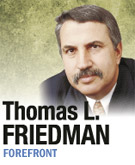Subscriber Benefit
As a subscriber you can listen to articles at work, in the car, or while you work out. Subscribe Now
 I’m reading a fascinating new book called “Why Nations Fail.” The more you read it, the more you appreciate what a fool’s errand we’re on in Afghanistan and how much we need to totally revamp our whole foreign aid strategy. But most intriguing are the warning flares the authors put up about both America and China.
I’m reading a fascinating new book called “Why Nations Fail.” The more you read it, the more you appreciate what a fool’s errand we’re on in Afghanistan and how much we need to totally revamp our whole foreign aid strategy. But most intriguing are the warning flares the authors put up about both America and China.
Co-written by the MIT economist Daron Acemoglu and Harvard political scientist James A. Robinson, “Why Nations Fail” argues that the key differentiator between countries is “institutions.” Nations thrive when they develop “inclusive” political and economic institutions, and they fail when those institutions become “extractive” and concentrate power and opportunity in the hands of only a few.
“Inclusive economic institutions that enforce property rights, create a level playing field, and encourage investments in new technologies and skills are more conducive to economic growth than extractive economic institutions that are structured to extract resources from the many by the few,” they write.
“Inclusive economic institutions, are in turn supported by, and support, inclusive political institutions,” which “distribute political power widely in a pluralistic manner and are able to achieve some amount of political centralization so as to establish law and order, the foundations of secure property rights, and an inclusive market economy.” Conversely, extractive political institutions that concentrate power in the hands of a few reinforce extractive economic institutions to hold power.
Acemoglu explained in an interview that their core point is that countries thrive when they build political and economic institutions that “unleash,” empower and protect the full potential of each citizen to innovate, invest and develop. Compare how well Eastern Europe has done since the fall of communism with post-Soviet states like Georgia or Uzbekistan, or Israel versus the Arab states, or Kurdistan versus the rest of Iraq. It’s all in the institutions.
The lesson of history, the authors argue, is that you can’t get your economics right if you don’t get your politics right, which is why they don’t buy the notion that China has found the magic formula for combining political control and economic growth.
“Our analysis,” says Acemoglu, “is that China is experiencing growth under extractive institutions—under the authoritarian grip of the Communist Party, which has been able to monopolize power and mobilize resources at a scale that has allowed for a burst of economic growth starting from a very low base,” but it’s not sustainable because it doesn’t foster the degree of “creative destruction” that is so vital for innovation and higher incomes.
The post-9/11 view that what ailed the Arab world and Afghanistan was a lack of democracy was not wrong, said Acemoglu. What was wrong was thinking that we could easily export it. Democratic change, to be sustainable, has to emerge from grass-roots movements, “but that does not mean there is nothing we can do,” he adds.
For instance, we should be transitioning away from military aid to regimes like Egypt and focusing instead on enabling more sectors of that society to have a say in politics. Right now, I’d argue, our foreign aid to Egypt, Pakistan and Afghanistan is really a ransom we pay their elites not to engage in bad behavior. We need to turn it into bait.
If we’re going to give money, “let’s use it to force them to open up the table and to strengthen the grass roots,” says Acemoglu.
We can only be a force multiplier. Where you have grass-roots movements that want to build inclusive institutions, we can enhance them. But we can’t create or substitute for them. Worse, in Afghanistan and many Arab states, our policies have often discouraged grass roots from emerging by our siding with convenient strongmen. So there’s nothing to multiply. If you multiply zero by 100, you still get zero.
And America? Acemoglu worries that our huge growth in economic inequality is undermining the inclusiveness of America’s institutions, too. “The real problem is that economic inequality, when it becomes this large, translates into political inequality.”
When one person can write a check to finance your whole campaign, how inclusive will you be as an elected official to listen to competing voices?•
• Friedman is a New York Times columnist. Send comments on this column to [email protected].
Please enable JavaScript to view this content.
